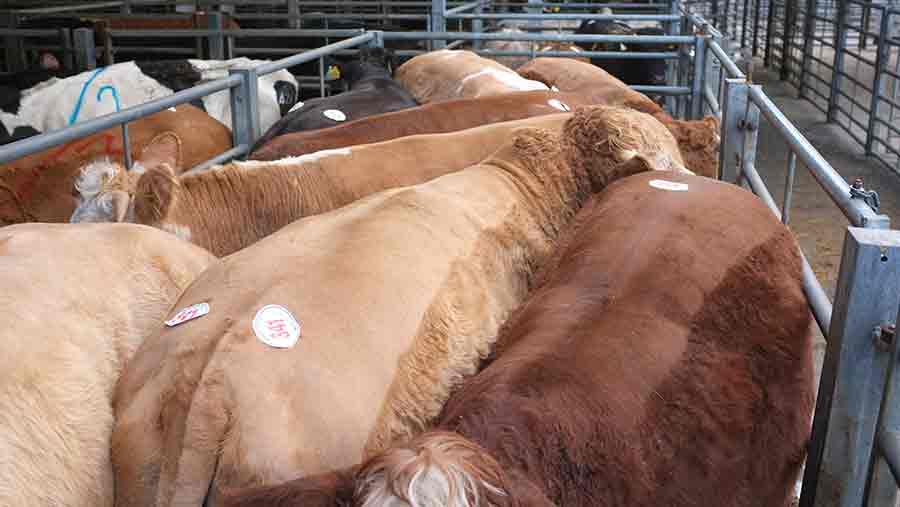Cattle oversupply stalls expected Christmas price rise
 © Tim Scrivener
© Tim Scrivener Prime cattle prices remain under pressure, with little sign that farmers are going to benefit from a pre-Christmas bounce in values.
Deadweight prices for prime cattle have been on a downward trend since the end of September, with high throughputs in October thought to be one of the main factors keeping a lid on values.
This is in contrast to 2017, when prices climbed throughout the month of November, before easing back at the start of December.
See also: How a group of beef farmers took over their supply chain
Price update
In the week ending 17 November, the GB all prime price averaged 358.08p/kg deadweight, which was a 2.9p/kg drop on the week before and 6p/kg below year earlier levels.
The average price for steers was 360.0p/kg, down more than 2.4/kg on the week before, while heifer prices fell 3.5p/kg to average 359.7p/kg deadweight.
Steers meeting the R4L specification in the week averaged 374.8p/kg, a decline of 3.1p/kg.
The deadweight market accounts for about 80% of the volume of prime cattle.
Slaughterings
Tom Forshaw, AHDB red meat analyst, said prime cattle slaughterings in October had been particularly high, which may have led to a build-up of supplies in storage.
Throughputs had fallen back to more normal levels in more recent weeks, but there had been no rise in values in line with Christmas demand.
“The fact this hasn’t happened may suggest demand is still lacklustre, and supply plentiful, or a combination of the two,” he said.
Ample supplies
Daniel Slade, deadweight procurement manager for Thame Market, said prices had eased, although cattle were still trading at a level in line with where they were last year.
The downward pressure seemed to be more to do with ample supplies than reduced demand, he said.
There had been good supply of prime cattle coming forward since the summer and also plenty of cow beef on the market because people had chosen to get rid of unproductive animals, rather than feed them after the dry summer.
“Abattoirs aren’t turning stock away – they do want the beast. But it can be bought at a price because there are a lot about.”
Liveweight
Andrew Armstrong, head auctioneer at Darlington Auction Mart, said while he had seen a bit of Christmas trade from small-scale supermarkets and butchers, they weren’t seeing the price rises of a few years ago.
“I think we’re seeing an OK price and we’re going to paddle that price right into Christmas,” he said. “I don’t think we’re going to have any great lift.”
Mr Armstrong said one factor keeping pressure on values was the amount of beef that had been imported from Ireland.
The cost of feed and the need for cashflow was also encouraging farmers to keep pushing cattle at the market, which was putting downward pressure on prices.
At Darlington’s most recent primestock sale on 22 November, bulls (740kg) had averaged 195p/kg liveweight, which is about the same price as they have been for the past three weeks, while heifers averaged 230p/kg liveweight and steers 215p/kg liveweight.
